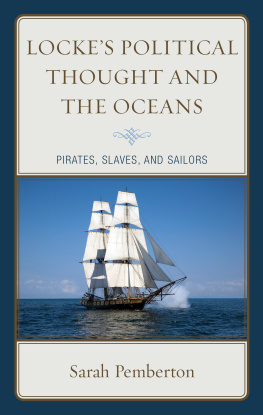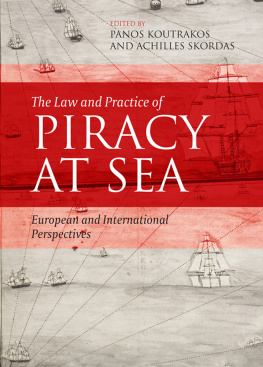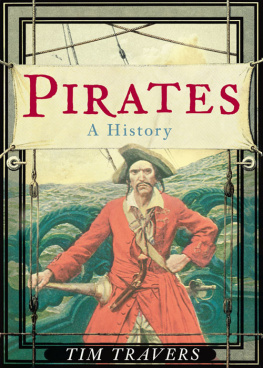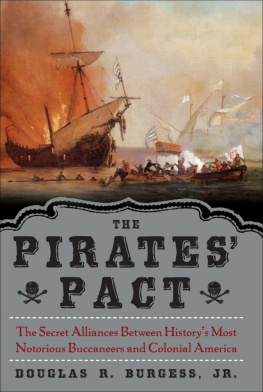THE POLITICS OF
PIRACY
CRIME AND CIVIL DISOBEDIENCE IN COLONIAL AMERICA
Douglas R. Burgess, Jr.
ForeEdge
ForeEdge
An imprint of University Press of New England
www.upne.com
2014 ForeEdge
All rights reserved
For permission to reproduce any of the material in this book, contact Permissions, University Press of New England,
One Court Street, Suite 250, Lebanon NH 03766;
or visit www.upne.com
Library of Congress Cataloging-in-Publication Data
Burgess, Douglas R.
The politics of piracy : crime and civil disobedience in colonial America / Douglas R. Burgess Jr.
pages cm
Includes bibliographical references and index.
ISBN 978-1-61168-527-5 (cloth : alk. paper)
ISBN 978-1-61168-698-2 (ebook)
1. PiratesUnited StatesHistory. 2. United StatesHistoryColonial period, ca. 16001775. 3. PiracyUnited StatesHistory. 4. Great BritainColonies
AmericaAdministration. I. Title.
E188.B954 2014
973.2dc23 2014009211
These, having not the law, are a law unto themselves.
ROMANS 2:14
CONTENTS
INTRODUCTION
THE SORROWFUL TALE OF ROBERT SNEAD
O N SEPTEMBER 20, 1697, customs agent Robert Snead penned a letter to the Board of Trade at Whitehall. The subject was his superior, Governor William Markham of Pennsylvania. Weeks before, the colony had received a proclamation from King William III enjoining all colonists to pursue and apprehend the notorious pirate Henry Every, whose depredations against the Great Mughal posed a serious problem for English trade.
Snead was excited, for he knew that several of Everys crew were currently residing in Philadelphia. I went at once to the Governor, he wrote the Board, and told him that several of Everys men were here, well known to him and all persons. He [Markham] said he knew it not. I told him here was enough to prove it, and that if he did not apprehend them I did not know how he could answer it. Markham blandly replied that if seamen brought good solid income to Philadelphia it was not his affair to ask how they got it. He refused to hear the proclamation when I offered to read it to him, but seemed very angry, so I left him.
Acting on his own initiative, Snead ordered the pirates arrested. Markham, less amused, ordered their release. The Governor was much displeased with me, Snead reported piously, and called me before his Council and asked what I had against those pirates to hinder their discharge. I told him there was proof enough that they were Everys men, and had the proclamation read.
Undeterred, Snead committed the pirates back to jail for a third time. He believed he had an ace up his sleeve: a London packet was due any day, carrying an agent from the Board of Trade with express instructions to round up Everys men throughout the colonies. Snead chose to hold out and play his dangerous game. Finally, in September 1697, the packet arrived. His chronicle becomes a grim record of what happened then:
A gentleman arrived from England and told me that... he desired the Governor that the pirates in prison might be better secured, and a guard set over them, and that Everys men might be sent home in one of the Kings frigates then in Virginia. No guard was set on them, so that the same night two of them got away. He then asked to take the other man in the frigate, but was refused. The gentlemans name was Robeson, a man of pusillanimous spirit, who was frightened by the Governor.
Snead retired into bitter obscurity. When Surveyor General Edward Randolph arrived some months later, long after Sneads letter had been received in London, he discovered several of Everys crew still living openly in the town. One, a ruthless character named Stephen Claus, resided across the street from the governors elegant townhouse. Others swaggered about Philadelphia, displaying gold watches and fine imported clothes. Everys second mate was luckiest of all: his share of the Great Mughals treasure had secured the marriage of Governor Markhams own daughter.
In his letter, Robert Snead was quick to ascribe a single cause for Markhams conduct: All people see how Arabian gold works with some consciences. Three centuries later, this is the same explanation commonly given to account for the conduct of men like William Markham of Pennsylvania, Benjamin Fletcher of New York, Thomas Modyford of Jamaica, Samuel Cranston of Rhode Island, and scores of other Atlantic governors whose relationships with the pirates and smugglers threatened English colonial policy.
But is it enough? Like Snead, many historians persist in regarding the pirates and their ilk as a separate and autonomous entity existing apart from and in conflict with colonial governments. Inspired by Daniel Defoes depiction of mutinous, disgruntled brigands at war with all the world,
This suggests a monolithic attitude toward the role of the English state and its relationship with the colonies. Just as the states terming of pirates as enemies of the human race comes to define them in these accounts, so too does the states perspective on the war on piracy. Whether protorevolutionaries or outright criminals, pirates are placed squarely on one side of the social spectrum, the Crown and colonies on the other.
As tempting as this narrative may be, it could not be more wrong. Instead of a pretext for reasserting control over the colonies, the politics of piracy represents a severely limited state responding to a crisis beyond its control. Piracy and illegal trade fostered a serious breach between the Crown and colonies in almost every sphereeconomic, social, political, and legal. The widespread and long-standing accord between Atlantic pirates, smugglers, merchants, and colonial administrators collided with the mercantilist policies of a new English bureaucracy, leading to a decades-long struggle over criminality, charter rights, trade relations, and the pursuit of English justice in its dominions. The ultimate results of this conflict were twofold: a vastly more intrusive and engaged Crown and, conversely, an independent American legal identity.
Historians have only recently examined the importance of crime in the formation of states.
In this view, criminals are as important within the social order as lawmakers, for their status defines the state itself.
The burgeoning interest in Atlantic world history has produced a number of scholars engaged in the consideration of the transmission of law and policy from Crown to colony. Elizabeth Mancke provided the parameters of the debate by outlining the effects of empire building on state formation. As empires expanded and began to interact with one another, state policy no longer could be contained within its own borders, but rather had to respond to international pressure both from other states and from an emerging international order. This, Mancke argues, led states with overseas interests to control or suppress privatized violence, including (and especially) piracy. Piracy, as a threat to trade and an infraction of international customary law, posed a grave challenge to the maintenance of amicable relations between empires. Consequently, international pressure, as well as complaints from the East India Company, contributed to a crackdown on piracy spearheaded by the Board of Trade after the Treaty of Ryswick in 1697.
Fifteen years before the publication of Manckes article, Robert Ritchies authoritative study presented the pirate William Kidd standing on the
The problem of colonial piracy is thus useful for examining the legal relations between Crown and colony because it residesliterally and metaphoricallyexactly halfway between the two. As such, it falls into a sort of no-mans-land between opposing historiographical camps of British political and colonial legal history. The former examines colonial policy from the perspective of its framers: the king, his ministers, and Parliament. The latter examines it from the perspective of the colonists. Thus the debate over the transmission of law from England to the colonies has split regarding the issue of the laws spiritual center: Is colonial law a creature of Whitehall or of individual colonial assemblies? Does








